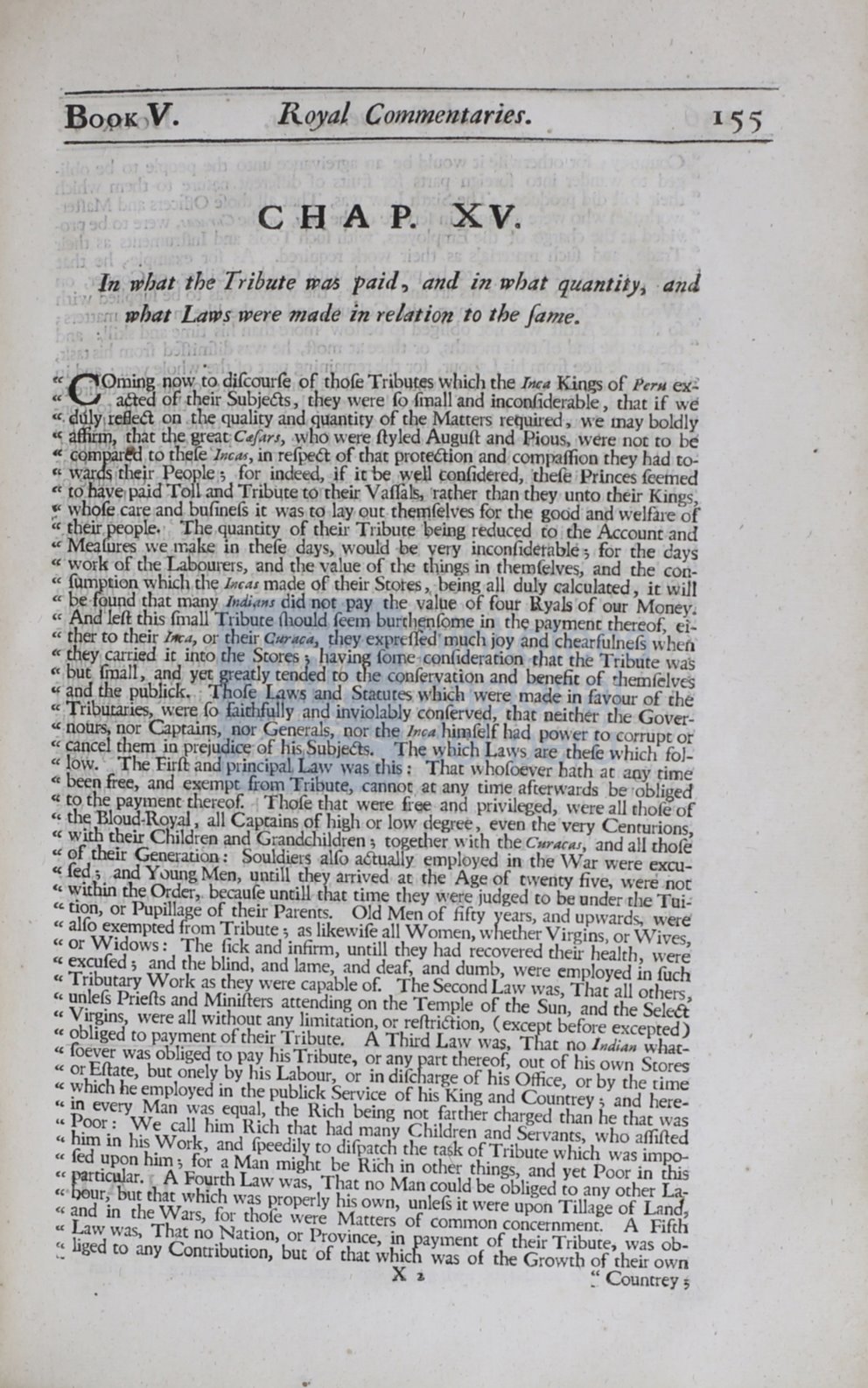

Royal Commentaries.
...
In
· ~hat
the Tribute
Wa5
paid, and in what quantity,
and
·.'
wbat Laws were made in relation to the fame.
" r.?[Qrning
now
~o
difcaurfe
of
thofe
Tribqtes
which the
Inca
Kings of
Peril
ex–
"
~
a¢teo
ot their
Subjeets, they
~ere
fo
fmall and inconf1derable , that
if
we
" ·<;idly,relileet
on the
quality and gµanucy
of
the
Matters required, we may boldly
~'
afWm
that
the
greac-Cefars,
who were
fiyled
Auguft
and
I?ious, were
not
to
be
~'
comF
co rbflfe
1ncM,
in
refpett of
that
proreetion and compaffion
rhey
had
to–
,,
w.,ar~
th¢¥.- People ; for.
indeed,
if.
it
be wdl
tonfidered,
'iliefe
Prince~ fee~ed
cc
to
havei
paidToll
and Tribute
to their Vaifals,
rather
than they unto
their
Kmgs,
c-c
whofe care and bnfinefS
it
was
to
lay out themfelves for the good and welfare of
~'their
people.
The
quantity of
their
Tribute
\->eing
reduced
co the
Account and
4
c
Meafiires we make in tbefe days, would be yery inconfidetable; for the days
" work of the
Labourers,
and the value of
the
tb
ings
in
themfelves, and the con–
" frunptic:m which
the
Incas
made
of their
Stores,( being
all duly
calculated,
it
will
cc
he·found
that many
Indiftn.r
did not pay the
value
o~
four Ryals of
our
Money.
cc
Apcflell:
this
fmall Tribute {hould
feem
burd1~nfome
m the
payment
thereof, ei
" ther
to
their
hlca,
or their
C.uraca~
they
exprefted much
joy
and chearfulnefs when
,, they carri«d
it
into the StoresJ· having
fome
confideration chat
the Tribute was
cc
but finall, and
Y~ .
greatly
ten ed co
the
confervation and b€nefic of themfelves
"and the
publi~k.
Thofe
Laws and Statutes
hich
were made
in
favour of the
cc
Tributaries,
were
fo
fairhfq11y
and
inviolably conferved, that
neither the
Gover–
" nobr.s, nor Captains, nor Generals, nor the
Inca
himfelf
had pow r to corrupt
or
cc
cancel them
in
prejudice
of
his,Subje&. The which Laws are thefe which foJ–
cc
low.
The
Eirfr
and principal
Law
was
this :
That \\' hofoever hath at a
y
time
''been free,. and
e~empt
from
Tribute.,
cannot. at
any
time afcerwards be
obliged
cc
to
the
payment
thereo£
'fhofe
that were
free
and privileged, were
all
thofe
of
''
th~
Bloud·Royal, all Capta.ias of high or
low
degree,
even
the
very
Centurions,
'' with
their Children and Grandchildren ; together \.\ ith the
CuracaJ,
and all chofe
" of
their
Generation :
ouldiers
alfo a&ually employed
in the
'i\T
ar
were
excu–
cc
fed ; .and Young Men, untiU
they
arrived
at the Age of twenty five, were
not
''within
the Order, becaufe unuill that time
they were
judged co be under rhe
Tui–
cc.
tion,
or
Pupillage
of their Parents.
Old
Men
of
fifty
years, and upwards, were
'' alfo exempted from
Tribute
~
as likewife all Women, whether
Virgins>
or
Wives.,
''or Widows: The
Gck
and
infirm,
umill
they
had recovered their
health,
were
" excufed;
and
the blind,
and
lame,
and
deaf,
and
dumb,
were
employed
in
fuch
''Tributary Work as they were
capable 0£
The
Second
Law was,
That
all
ochers
'' unle!S
Priell:s
and
Minill:ers
attending on the Temple
of the Sun,
and the Seled
cc
Virgins, were all without any limitation, or refirietion, (except before excepted)
''obliged
to
payment
of their
Tribute.
A
Third
Law
was,
That
no
I ndian
what–
'' foever was obliged to pay his Tribute,
or
any
pare
thereof, out
of
his
own Stores
" or Ell:ate, but onely
by
his Labour, or
in difcharge
of
his
Office,
or
by
the time
"~hich
he
employed
in the
publick
Service
of
his
King
and
Counrrey; and
here–
,, m
every
Man was equal,
the
Rich being
not
farther charged than he that
was
'' P?or.:
'V:f
e call him Rich that
had many
Children
and
Servants,
who
affilled
c,
hun m
his
Work,
and fpeedily to
difpatch the
ta$k
of
Tribute
which was
irnRO–
" fed
~pon
him ;
for
a Man
might be Rich
in other
things, and yet
Poor in this
'' pamcular.
A
Fo';lrth
Law was, That
no
Man could be obliged
to any
other La–
,,
bour~
but that which
was
properly his own,
unle!S it
were upon
Tillage
of Land,
'' and
m
the
Wars, for thofe were Matters of common concernment. A
Fifch
" I:aw was, That no
_Na~ion,
or Province,
~
payment of their T ribute, was ob–
~~
liged
to
any
Contnbunon,
but
of that which
was
of
the
Growth of
their
own
X
a.
~~
Countrey ,














